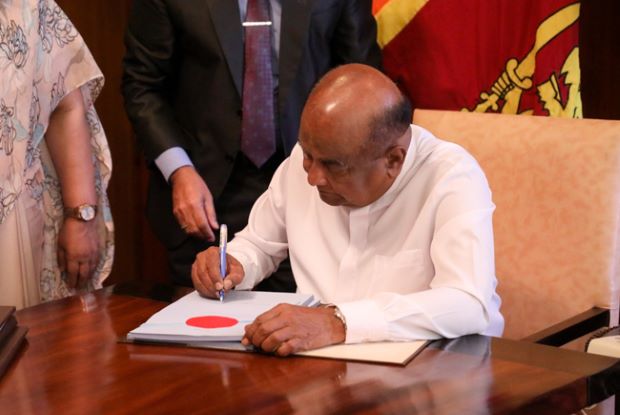Sri Lanka opposition to table no-faith motion against speaker on Tuesday
COLOMBO— Opposition parties in Sri Lanka will table a motion of no confidence (NCM) against incumbent speaker Mahinda Yapa Abeywardena on Tuesday (5), opposition lawmaker G. L. Peiris said, describing it as a special event.
Speaking to reporters on Monday (4), Peiris said NCMs have been tabled against four prime ministers and 14 ministers, and against 27 governments as a whole.
Claiming no NCM had been tabled against a speaker, (though records reveal several Speakers have faced NCMs since 1963, though none of those motions were passed), he said the opposition has taken this decision responsibly, looking ahead and in the absence of an alternative.
“All parties in the opposition have already expressed their full support for this NCM. This too is a rare occurrence. Various opinions exist within the opposition, but when it comes to this matter, every group in the opposition has been able to reach a consensus,” Peiris said.
The NCM was filed by the main opposition Samagi Jana Balawegaya (SJB) against Speaker Abeywardena for approving the controversial Online Safety Bill allegedly in violation of Supreme Court recommendations.
The SJB said previously that the motion was filed against the speaker’s “gross misconduct and disregard for the supreme law of the land,” noting in a statement that he had betrayed the trust of the people and the Parliament and it was time to unite for transparency and accountability.
Peiris is not a member of the SJB but sits in the opposition. His formation of ‘independent MPs formerly of the ruling Sri Lanka Podujana Peramuna (SLPP) was party to the signing of the NCM against Speaker Abeywardena on February 26.
Tamil National Alliance (TNA) MP M. A. Sumanthiran, a vocal critic of the bill, was also part of the signatories to the motion.
Parliament’s recent passing of the Online Safety Bill (OBS) has been controversial.
The Centre for Policy Alternatives (CPA) said in January that the process followed in enacting the bill raised serious questions on law-making and its impact on constitutional democracy. The organization urged the government to replace the act with a law that “genuinely addresses” concerns about online safety.
Claiming that the process of drafting the OSA was shrouded in secrecy, CPA said the rushed manner of its passage raises questions as to the intentions of the government in enacting a law that has significant implications for fundamental rights and the rule of law in Sri Lanka.
The constitutionality of the Online Safety Bill was challenged by 53 individuals and organizations in the Supreme Court, which later determined that 32 clauses of the bill needed to be amended if the bill was to be passed by a simple majority in Parliament. The bill was rushed through parliament and adopted with 108 votes for and 62 against, and later endorsed by the Speaker, making it into law. Allegations have been widespread that many bill was passed without adhering to many of the amendments mandated by the Supreme Court.
-economynext.com/ENCL



Comments are closed, but trackbacks and pingbacks are open.